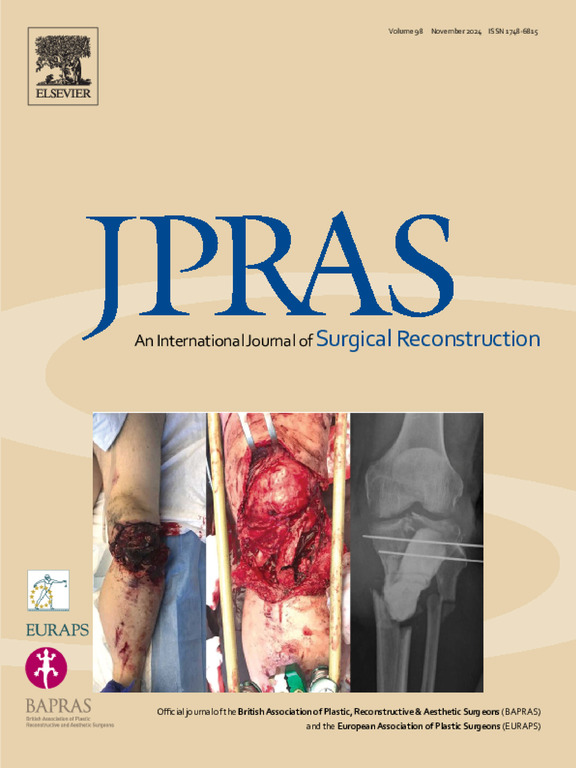Evidence-based artificial intelligence: Implementing retrieval-augmented generation models to enhance clinical decision support in plastic surgery
IF 2
3区 医学
Q2 SURGERY
Journal of Plastic Reconstructive and Aesthetic Surgery
Pub Date : 2025-03-31
DOI:10.1016/j.bjps.2025.03.053
引用次数: 0
Abstract
The rapid advancement of large language models (LLMs) has generated significant enthusiasm within healthcare, especially in supporting clinical decision-making and patient management. However, inherent limitations including hallucinations, outdated clinical context, and unreliable references pose serious concerns for their clinical utility. Retrieval-Augmented Generation (RAG) models address these limitations by integrating validated, curated medical literature directly into AI workflows, significantly enhancing the accuracy, relevance, and transparency of generated outputs. This viewpoint discusses how RAG frameworks can specifically benefit plastic and reconstructive surgery by providing contextually accurate, evidence-based, and clinically grounded support for decision-making. Potential clinical applications include clinical decision support, efficient evidence synthesis, customizable patient education, informed consent materials, multilingual capabilities, and structured surgical documentation. By querying specialized databases that incorporate contemporary guidelines and literature, RAG models can markedly reduce inaccuracies and increase the reliability of AI-generated responses. However, the implementation of RAG technology demands rigorous database curation, regular updating with guidelines from surgical societies, and ongoing validation to maintain clinical relevance. Addressing challenges related to data privacy, governance, ethical considerations, and user training remains critical for successful clinical adoption. In conclusion, RAG models represent a significant advancement in overcoming traditional LLM limitations, promoting transparency and clinical accuracy with great potential for plastic surgery. Plastic surgeons and researchers are encouraged to explore and integrate these innovative generative AI frameworks to enhance patient care, surgical outcomes, communication, documentation quality, and education.
基于证据的人工智能:实现检索增强生成模型以增强整形外科的临床决策支持
大型语言模型(llm)的快速发展在医疗保健领域引起了极大的热情,特别是在支持临床决策和患者管理方面。然而,其固有的局限性,包括幻觉、过时的临床背景和不可靠的参考文献,严重影响了其临床应用。检索增强生成(RAG)模型通过将经过验证的、经过整理的医学文献直接集成到人工智能工作流程中,显著提高了生成输出的准确性、相关性和透明度,从而解决了这些限制。这一观点讨论了RAG框架如何通过为决策提供上下文准确的、循证的和临床基础的支持来特别有利于整形和重建手术。潜在的临床应用包括临床决策支持、有效的证据合成、可定制的患者教育、知情同意材料、多语言能力和结构化的手术文件。通过查询包含当代指南和文献的专业数据库,RAG模型可以显着减少不准确性并提高人工智能生成的响应的可靠性。然而,RAG技术的实施需要严格的数据库管理,根据外科学会的指南定期更新,并持续验证以保持临床相关性。解决与数据隐私、治理、道德考虑和用户培训相关的挑战对于成功的临床应用仍然至关重要。总之,RAG模型在克服传统LLM限制方面取得了重大进展,提高了透明度和临床准确性,具有很大的整形外科潜力。鼓励整形外科医生和研究人员探索和整合这些创新的生成式人工智能框架,以提高患者护理、手术效果、沟通、文档质量和教育。
本文章由计算机程序翻译,如有差异,请以英文原文为准。
求助全文
约1分钟内获得全文
求助全文
来源期刊
CiteScore
3.10
自引率
11.10%
发文量
578
审稿时长
3.5 months
期刊介绍:
JPRAS An International Journal of Surgical Reconstruction is one of the world''s leading international journals, covering all the reconstructive and aesthetic aspects of plastic surgery.
The journal presents the latest surgical procedures with audit and outcome studies of new and established techniques in plastic surgery including: cleft lip and palate and other heads and neck surgery, hand surgery, lower limb trauma, burns, skin cancer, breast surgery and aesthetic surgery.

 求助内容:
求助内容: 应助结果提醒方式:
应助结果提醒方式:


